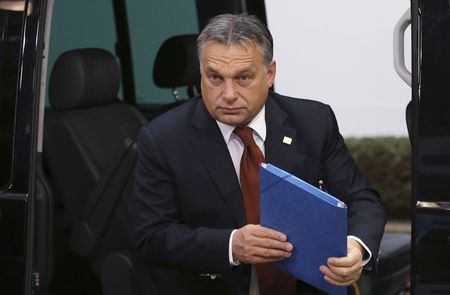By Krizstina Than
BUDAPEST (Reuters) - Hungary should back European Union sanctions against Russia and not talk about granting autonomy for ethnic Hungarians living in Ukraine at this time of instability, an American diplomat said in Budapest on Friday.
U.S. Chargé d'Affaires André Goodfriend criticised some of Prime Minister Viktor Orban's policies towards Russia such as support for the South Stream gas pipeline and granting Russia a contract to expand Hungary's Paks nuclear plant in a process that he said lacked transparency.
This week the United States said six Hungarians - public servants or people with government connections - had been banned from entering the U.S. because of alleged corruption. Budapest has asked the U.S. to present the evidence for the allegations.
Goodfriend told a news conference on Friday that the ban was not based upon Hungarian policies, but was related to specific action taken by the individuals, whom he declined to name.
He said Hungary, once an example for others after its peaceful transition to liberal democracy after 1989, was rapidly becoming a place where the rule of law has weakened and civil society has come under attack.
Orban's government has clashed several times with the European Union and the United States over reforms that critics said harmed some foreign investors and weakened the system of checks and balances in the former communist country.
BILATERAL DISCUSSIONS
Goodfriend said the U.S. has discussed several issues with Budapest regarding its relations with Russia.
Given Russia's role in the Ukraine crisis, he said, Budapest should "stand firm with the EU, with EU sanctions," and "to understand the sensitivities on the ethnic nationalism question."
"Particularly with calls for autonomy among Hungarian ethnic nationals in Ukraine," Goodfriend said, "this is not the time to have that discussion."
It was not the time for Hungary "to break with its EU partners to criticise so publicly the approach that the partners have taken and which Hungary agreed to," he said.
Orban, reelected in a landslide win in April, called for autonomy for about 200,000 ethnic Hungarians in western Ukraine earlier this year.
Hungary, along with some other eastern European countries, has criticised the EU's economic sanctions against Russia.
Heavily reliant on gas from Russia, Budapest is also strongly promoting the construction of the South Stream gas pipeline. The EU has yet to rule on whether the $40 billion project complies with European Union law.
Hungary argues that South Stream would boost its energy security by providing an alternative supply route.
Goodfriend said the U.S. could not agree with Hungary's policy to diversify the routes for its gas purchases, instead of diversifying its sources.

"We disagree with that approach, because we think that diversifying sources is what's important," he said. South Stream would provide gas from the same source - Russia - that already provided gas to Hungary, he said.
(Reporting by Krisztina Than; Editing by Tom Heneghan)
